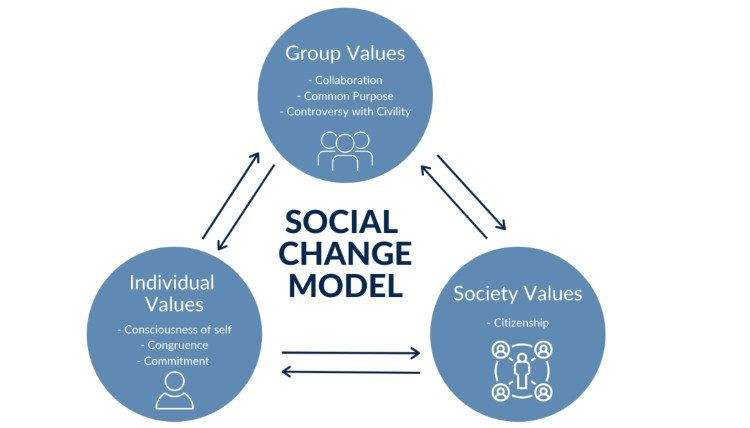Social Change Model
The Social Change Model of Leadership Development (Higher Education Research Institute [HERI], 1996) approaches leadership as a purposeful, collaborative, values-based process that results in positive social change. The Model is built on several key assumptions:
- Leadership is socially responsible, it impacts change on behalf of others
- Leadership is collaborative
- Leadership is a process, not a position
- Leadership is inclusive and accessible to all people
- Leadership should be values-based
- Community involvement/service is a powerful vehicle for leadership
7 C's of Leadership
Consciousness of Self
This includes understanding the values of self and other, how change happens, and our own strengths and weaknesses. A commitment and readiness for positive social change and the ability to reflect and give and receive feedback is important.
Congruence
Congruence is knowing personal values and that values are relative to the individual. This involves a commitment to self-evaluation, respect for different opinions, and the ability to work in a group towards a shared purpose.
Commitment
Understanding the goals and targets of a group, while being aware of personal values, passion, and internal motivations, is key to Commitment. Engagement, involvement, and discipline are important values to take willful action.
Collaboration
Collaboration includes intercultural awareness and competence, while also focusing on strong listening, speaking, and reflective dialogue. This builds the belief that working together can generate stronger, more creative solutions while fostering trust and trusting relationships among group members.
Common Purpose
The core mission and values of the group is important to recognize in every group. Common purpose involves a commitment to the group and the vision while also focusing on the social responsibility involved. Inclusive attitudes, decision-making skills, and the ability to work with others is key.
Controversy with Civility
This includes acknowledging the attitudes, biases, and values that everyone brings to the group. Recognize that a difference in viewpoints is inevitable and each group needs an inclusive attitude, purpose, patience, and engagement in dialogue and the ability to mediate and negotiate to be successful.
Citizenship
Social responsibility and larger social values are important for leaders to focus on. Understand the rights and responsibilities, social justice, and personal and community values to be successful. Believe in one’s personal ability to make a difference, while focusing around interdependent thinking with an ethic of care. Challenging assumptions, advocacy, diplomacy, and an appreciation for diversity are key to citizenship.
Change
Finally, it is important to recognize that change is a process and there will be resistance to change at all levels (society, community, groups, and individuals). Self-confidence and the willingness to step outside of one’s comfort zones will bring about the ability to articulate a vision and influence systems.
Komives, S. R., & Wagner, W. (Eds.). (2016). Leadership for a better world: Understanding the social change model of leadership development. John Wiley & Sons.
Komives, S. R., & Wagner, W. (Eds.). (2017). Leadership for a better world: Understanding the social change model of leadership development. John Wiley & Sons.

